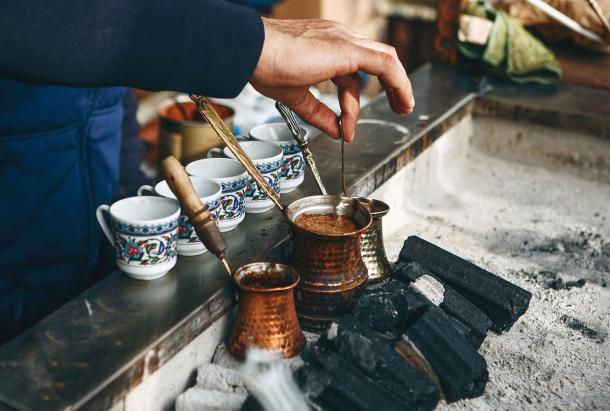Idea
Turkish coffee, not just a drink but a culture

Fulya Ozerkan
Journalist in Istanbul, Türkiye
Large crowds pass by the colourful stalls in Eminonu as sellers' voices fill the air in this old neighbourhood on the south bank of the Golden Horn. It’s easy to locate the Turkish coffee shop Kuru Kahveci Mehmet Efendi because of the long line that forms outside. Or you can simply follow the strong aroma that fills the air after you leave Istanbul's iconic Grand Bazaar.
Among those queuing is Guldane Aktas, 50, who drinks two cups of Turkish coffee a day. The distinct scent of ground coffee beans boosts her mood and brings a smile to her face. "It's worth the wait in the queue. The coffee is very fresh," she says. "Whenever I stop over in Eminonu, I don't leave before getting my pack of Turkish coffee."
"Turkish coffee is strong but it doesn't matter. We like its taste," says Syrian refugee woman Safiye, waiting in the queue alongside her husband.
Cenk Girginol, author of Coffee: from the Soil to the Cup, describes Turkish coffee as a culture because it has never existed solely as a beverage. According to a famous Turkish proverb, a cup of coffee can create a friendship that lasts for 40 years. Turkish coffee culture and tradition was added to the UNESCO Representative List of the Intangible Cultural Heritage in 2013.
Salted coffee for the groom
In the past, Turkish coffee was an integral part of social life in neighbourhood coffee houses. In Anatolia it served as a means of resolving disputes. Whenever two men fell out in the village, they were served friendship coffee to open a dialogue and end their resentment.
Today it plays a major role in wedding rituals. When the groom's family visits the bride's house before the wedding, the bride is expected to prepare a perfect Turkish coffee. In the past, this was often the only opportunity for the future bride and groom to meet. If the bride was fond of the groom-to-be, she would prepare coffee with sugar, but if she didn't like the candidate, she would put salt in his coffee instead. Today, paradoxically, some future brides serve salty coffee to the groom during this ritual to measure the extent of his love. If he likes the girl, he drinks the salty coffee instead of spitting it out.
In Anatolia, whenever two persons fell out, a friendship coffee was served to end the dispute
"Coffee has always been used as a pretext to initiate a conversation," Cenk Girginol says. Coffee plays a major role in everyday life, whether it's in the form of "morning coffee" (sabah kahvesi), "pleasure coffee" (keyif kahvesi) or "fatigue coffee" (yorgunluk kahvesi).
The preparation is quite a ceremony in itself. All you need is a small pot with a long handle called cezve and a small coffee cup called fincan with its saucer. As the coffee starts to boil, foam rises on top. This foam is the distinctive feature of a good Turkish coffee, which is served with a glass of water and accompanied by Turkish delight.
"There is also the ritual of reading coffee grounds," Girginol adds. The grounds left in the empty cup are often used to tell a person’s fortune. Forecasting the future among friends or consulting professional fortune-tellers is a popular pastime. There are even apps, such as Faladdin, that provide comments within seconds after sending a picture of an empty cup.
Grinding and roasting
The history of Turkish coffee dates back to the 16th century and the reign of the Ottoman Sultan Suleiman the Magnificent. Legend tells us that an Ottoman governor who was posted in Yemen became fond of the coffee and introduced it to the palace's cuisine.
"The first coffee house opened in Istanbul in 1554," Girginol says. He explains that during the 1683 Siege of Vienna, the Ottoman troops abandoned coffee sacks after failing to capture the city, thus introducing coffee to Europe. “Its popularity has rapidly spread to other countries since then."
"When coffee beans arrived in the Ottoman lands, they were roasted, ground and cooked to turn into a unique taste. Today, we all enjoy drinking coffee thanks to the Turks who introduced a new brewing technique in the 16th century," claims Gizem Salcigil White, a Turkish-American entrepreneur nicknamed "Turkish Coffee Lady". “After five centuries, this ancient coffee pot cezve is still in use in Türkiye as well as many Balkan and Middle Eastern countries,” she adds.
White has been travelling the world with an award-winning Turkish Coffee Truck since 2012 to increase awareness of Turkish coffee culture in the United States and beyond.

'Turkish coffee' does not mean coffee produced in Türkiye, but the method of making it: the roast level and grinding of the beans
“Turkish coffee” does not mean coffee produced in Türkiye, according to Osman Serim, board member of the Turkish Coffee Culture and Research Association. According to him, "it is not the botanical type but the method of making it that counts: the degree of roasting – medium roast – and grinding". In Turkish coffee, the beans are ground even thinner than in Italian espresso, Serim says. "This makes it possible to serve the coffee with the grounds. The grounds do not enter the mouth."
Like everywhere else, Western coffee chains have expanded in Türkiye in recent years. But Cenk Girginol is positive that despite the popularity of foreign brands, the local coffee culture will prevail. Osman Serim agrees. "Turkish coffee is not in danger of extinction. On the contrary it is getting very popular, especially among young people."
Turkish coffee culture recognized as intangible cultural heritage
Turkish coffee culture and tradition were included in the UNESCO Representative List of the Intangible Cultural Heritage in 2013, recognizing the unique ways in which the coffee is prepared and brewed, as well as its rich communal traditions, as an important part of Turkish cultural heritage.
Turkish coffee is prepared by first grinding freshly roasted beans finely. Then the ground coffee, cold water and sugar are added to a coffee pot and brewed slowly to produce the desired foam. The beverage is served in small cups and is mainly drunk in coffee houses.
The tradition permeates all walks of life. Celebrated in literature and songs, Turkish coffee is a symbol of friendship, hospitality and refinement. It plays a key role in social occasions such as engagement ceremonies and holidays.
In the same issue










